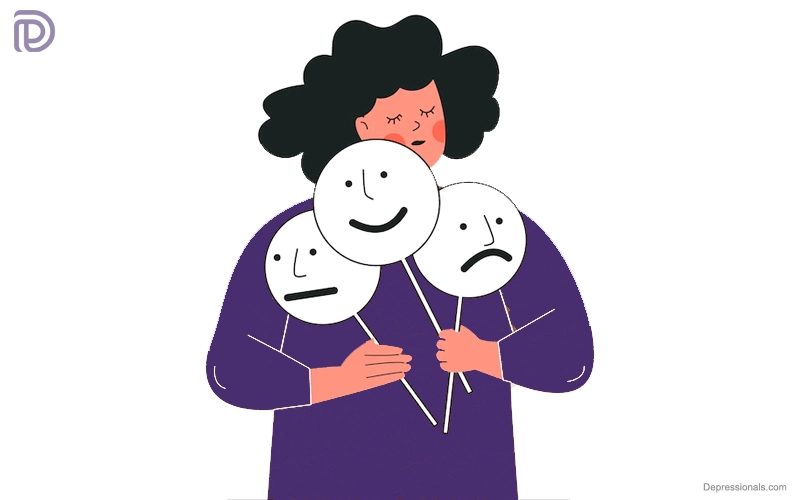We tend to use the term narcissist to describe someone who is self-obsessed and lacking in empathy. Narcissistic personality disorder (NPD) is a legitimate mental health condition that must be diagnosed by a mental health professional.
Some narcissistic traits can still be present even if a person does not have NPD. The following are possible examples:
- An inflated sense of self
- Constantly needing praise
- Utilizing others for your gain
- Ignoring the needs of others or not caring for them
Even though they are very self-assured, narcissistic types usually are highly sensitive to criticism.
This article discusses some tips you can use to deal with a narcissist, along with when to move on when the relationship is over.
Read: Paranoid Personality Disorder
Tips to deal with a narcissist
1. Get to know their true character
Narcissistic individuals can be pretty charming when they want to be. Perhaps you will be enticed by their grand promises and grand ideas. Their popularity in the workplace can also be attributed to this.
It is important to watch how they treat others when they’re not on stage. If they hurt someone else, lie, manipulate, or dishonor their word, there is no reason to think they won’t treat you the same way.
It’s essential to just accept that narcissistic people are who they are – there’s not much you can do to change them.
Likely, they don’t care about your wants and needs regardless of what a narcissistic person may say. You may encounter resistance if you discuss this issue.
Readout all: Personality Disorders
2. Stop focusing on them and break the spell
Narcissistic personalities tend to attract attention when they’re around. Narcissists work hard to keep themselves in the spotlight, whether it’s negative or positive attention.
If you buy into this tactic, you may find yourself neglecting your own needs to please them.
It may never come to an end if you keep waiting for these tendencies to cease. Your life will never be enough to accommodate their needs, no matter how much you change.
Don’t allow a narcissistic personality to invade your worldview or define your sense of self if you deal with a narcissist. Your opinion matters, too. Remember your strengths, desires, and goals regularly.
Put yourself first and remember you don’t have to fix them. Manage your time well and carve out some “me time.”
3. Speak up for yourself
It is sometimes better to ignore or walk away from something – pick your battles, yes?
There are a lot of factors that contribute to success in relationships. When dealing with a boss, parent or spouse, your strategy may differ from that of a co-worker, sibling, or child.
Some narcissistic people enjoy making others uncomfortable. This may occur, so try not to appear agitated or enraged, as this will encourage them to continue talking.
It is your responsibility to speak up if you want to keep those close to you in your life. Make sure you do this calmly and gently.
You must express the impact their conduct and words have on you. You should be specific and consistent in what’s unacceptable and what you expect in return. Do not be surprised if they do not understand – or care.
Read: Schizoid Personality Disorder
4. Set clear boundaries
Self-absorbed individuals often have narcissistic personalities.
Some people believe that they have the right to follow you wherever they want, to look over your things or to express their feelings. You may receive advice uninvited and be given credit for things you have worked on. You will be forced to talk about private issues in a public setting.
The lack of a sense of personal space may also lead them to cross all sorts of boundaries. Most of the time, they don’t even notice them. That’s why it’s so important for you to clearly define the boundaries you value.
Why would they care about the consequences? When things begin to affect them personally, someone with a narcissistic personality tends to pay attention.
Please make sure that the threat is not idle. Only discuss consequences if you’re willing to follow through with them. You won’t be believed for a long time unless you do it.
For example: Imagine that you have a co-worker who likes to park their big truck in a way that makes it difficult for you to back out. Let them know that you need enough space by asking for it firmly. Tell them what will happen if they don’t follow your instructions.
You will tow their car if you are unable to safely back out. It’s important to call the towing company the next time it happens.
Read: Borderline Personality Disorder
5. Expect them to push back
You can expect someone with a narcissistic personality to respond if you stand up to them.
If you set boundaries and speak up to deal with a narcissist, they may come back with a list of their own demands. Furthermore, they may try to make you feel guilty and believe that you’re the one being unreasonable and controlling. Possibly, they are trying to win sympathy.
You should be prepared to defend yourself. It will be difficult to take you seriously if you step backward.
6. Remember that you’re not at fault
Those with narcissistic personality disorders won’t take responsibility for their actions or admit a mistake. Rather than improving themselves, they focus on improving themselves through you.
Even when you’re tempted to shirk responsibility to keep the peace, you are not under any obligation to sully your own honor.
You are aware of the truth. Do not let anyone rob you of that.
Read: Antisocial Personality Disorder
7. Find a support system
Try to build up good relationships with people who can support you if you can’t escape the person. It can be emotionally draining to spend too long in a dysfunctional relationship with someone who has a narcissistic personality.
Don’t forget to nurture new friendships and rekindle old ones. Spend more time with your family. Take a class to learn more about a new hobby if you don’t have many friends. Join a local charity or volunteer in your community. Engage in activities that allow you to meet more people.
WHAT IS A HEALTHY RELATIONSHIP?
When you’re in relationships with narcissists, it may be hard for you to remember what healthy relationships really are.
Here are a few things to look for:
- They listen to each other and try to understand each other
- Each individual accepts responsibility for his or her mistakes
- When they are together, both feel they can be themselves and relax
Read: Schizotypal Personality Disorder
8. Insist on immediate action, not promises
It is the nature of narcissistic people to make promises. You can be assured they will do what you want rather than what you hate. It is generally expected that they will do better in the future.
These promises may be sincere. There is no doubt about this: The promise is one of the ways narcissists achieve their goals.
The motivation is lost as soon as they achieve their goal. They cannot be trusted to act as they say.
Don’t give up on your goal. Make sure they only fulfill your requests after you have fulfilled theirs.
Keep your position firm. You’ll succeed if you are consistent.
Read: Obsessive-Compulsive Personality Disorder
9. Be aware that narcissists may require professional help
NPD sufferers typically don’t consider themselves victims of the condition. Due to this, they’re unlikely to seek professional guidance.
But people with NPD are often also suffering from other disorders, including substance abuse and mental health issues. Someone can seek treatment because they have another disorder.
It isn’t your job to make them seek professional help, but you can suggest it. Not you, but they are responsible for it.
However, NPD is not an excuse for bad or abusive behavior, even if it is a mental health condition.
10. Know when to ask for help
Being regularly exposed to someone with a narcissistic personality can be both mentally and physically draining.
Consult your primary care physician if you are experiencing symptoms of anxiety, depression, or illness. During your checkup, you could be referred to other services, such as a therapist or support group.
Ensure that your support system is in place by reaching out to friends and family. Going it alone isn’t necessary.
Seek help: Mental Help Resources
Narcissists and relationships
Manly learned a lot about narcissists from her older sister and her experiences working with them. “Narcissists are only concerned about themselves. Often, when workers and families have issues, they blame others,” she says.
If you deal with a narcissist, you will experience that narcissist may do anything to get what he or she wants. It’s common for them not to feel compassion and they can’t relate to others intimately, even with people they care about.
In the workplace, narcissists may seek admiration regardless of the consequences. They can take credit for other people’s work, undermine coworkers, or change how they behave to gain the approval of higher-level people. There is often something more than meets the eye when it comes to these people despite their friendly nature and dedication to their work.
A narcissist can ruin the family dynamic at home. Oftentimes, a narcissist who is in an intimate relationship will be judgmental, distant, and dismissive. Invisibility, disrespect and loneliness could be the result. When you are the child of a narcissist, you may have experienced neglect and abuse.
If you ever deal with a narcissist, you should sometimes end your relationship.
Manly says he decides to step back from cultivating a special relationship with his brother for his mental health. Because her sibling does not see their behavior as a problem, and since she does not want to grow with them, an ongoing relationship will only cause more frustration.
Relationships with narcissists can be challenging. “Get ready for a bumpy ride,” says Forrest Talley, Ph.D., a clinical psychologist in Folsom, California. “It will be an extremely taxing relationship.”
Read: What is a Toxic Relationship
When to move on
It is very hard to deal with a narcissist forever. Narcissistic people can also abuse their partners verbally or emotionally.
An abusive relationship will display the following signs:
- Insults and name-calling
- Patronizing, humiliating public figures
- Threatening and yelling
- Accusations, jealousy
The following warning signs might also be present:
- All our problems are your fault
- You are being monitored or isolated
- Your true feelings or what you should feel
- Continually pointing out your shortcomings
- Denial of obvious things or gaslighting
- Making your needs and opinions trivial
Where do you draw the line between a successful outcome and a total failure? There are ups and downs in every relationship, right?
Although this is true, it’s generally recommended that you leave the relationship if:
- There is verbal or emotional abuse being perpetrated against you
- The situation feels manipulative and controlling to you
- Feel threatened or abused physically
- Feelings of isolation
- An individual with a narcissistic personality disorder or a narcissistic personality shows signs of mental illness or substance abuse, but won’t get help
- There has been a negative impact on your mental or physical health






The article is good. Thank you so much.
These kind of post are always inspiring and I prefer to check out quality content so I happy to finally find many excellent point here in the post, writing is simply great, thank you for the post
Do you have a spam issue on this site; I also am a blogger,
and I was curious about your situation; we have created some nice practices and we are looking to trade solutions with others, be sure to shoot me an e-mail if interested.
This is very informative.
At first glance, the website seems quite simple.